- Home
- Claudia Mills
Makeovers by Marcia Page 2
Makeovers by Marcia Read online
Page 2
“Where’s your schedule?” Alex asked.
Marcia shrugged off her backpack as gracefully as she could and pulled her schedule from her pink binder.
“Hand it over,” Alex said.
Marcia waited for his report. Please, oh please, let us have lots of classes together.
“We’re in math and French together, and social studies and English. Are you ready for the Cow again?”
Marcia giggled. She and Alex had taken a summer French class together a year ago and suffered through strict Madame Cowper. Marcia had thought about switching to Spanish, which was supposed to be easier anyway, but her father said it would be foolish to waste the French she had already learned, so she’d be in Madame Cowper’s company for second period all year. At least Alex would be there with her.
“It’s Williams who’s supposed to be the real killer,” Alex said, still studying Marcia’s schedule. “Social studies. She thinks we should all go out and save the world. You’re taking art? I didn’t know you were into art.”
Apparently Alex had never seen Marcia’s sketches of him in her math notebook. “I like to draw.” She should have taken art last year instead of chorus.
“Let’s see how much you like it after Morrison is through with you.”
“Is he mean?”
“My sister, Cara, had him. I don’t know if you’d call him mean, exactly, but—Well, you’ll see.”
The bell rang. The sixth graders started running. The seventh graders started walking. The eighth graders stayed in their small groups talking.
“Shall we?” Alex asked. They sauntered into West Creek Middle School together.
First period was math with ancient, doddering Mr. Adams. He spoke in a whispery wheeze that could barely be heard and held on to the chalkboard ledge with his free hand while he wrote on the board with trembling, arthritic fingers. The class, even Alex, was surprisingly well behaved, as if afraid that at any moment he might keel over right in front of them.
“I thought they made teachers retire before they’re ninety-five,” Alex said to Marcia as they walked down the hall to French.
Marcia giggled again.
Madame Cowper’s broad face brightened when she saw them. “Mademoiselle Faitak, Monsieur Ryan, entrez, s’il vous plaît! Come in! Je suis enchantée de vous revoir. I am so happy to see you again!”
Marcia greatly doubted this was true. Alex in particular had been awful throughout Intensive Summer Language Learning two summers ago, and she herself had laughed appreciatively at all his antics, as well as at his jokes about Madame Cowper’s stout figure stuffed into snug polyester pantsuits. It would take more than Purple Pizzazz nail polish to deflect the eye from Madame Cowper’s plump posterior. But given the events of the last twenty-four hours, jokes about someone’s weight didn’t seem as funny to Marcia anymore.
By the end of class, Marcia decided that French would be pretty easy, given her head start from the summer class. She remembered quite a bit, even from a year ago. Her father had been right, after all.
Ms. Williams, the third-period social studies teacher, was extremely tall and elegantly slim, in a bright red suit with a crisp white blouse that set off her dark skin. Her erect posture reminded Marcia to suck in her own stomach.
In eighth-grade social studies they would cover civics and debate important, controversial issues of the day, Ms. Williams said. Marcia snuck a sidelong glance at Alex. Would it be more romantic to be debate partners or debate opponents? She didn’t know.
“My approach to teaching,” Ms. Williams went on, “is centered on service learning. Does anyone know what service learning is?”
No one did, not even Lizzie.
“In service learning,” Ms. Williams explained, “students learn through community service. Each of you will engage in one major service project of your own choosing. I expect you to devote three hours a week to it. Of course, this will be in addition to time spent on outside reading, paper writing, and studying for exams.”
That was a lot of time to devote to any one subject. Already protesting hands were in the air.
“I’m on a traveling soccer team,” one boy said. “We go on the road practically every single weekend. I’m not going to have time to do three hours a week of community service.”
“I don’t design the requirements of my course to accommodate your extracurricular activities. I expect you to arrange your extracurricular activities to accommodate the requirements of my course.”
“But—what if you just can’t do it?” the boy asked.
Ms. Williams gave an elaborate shrug of indifference. It was clear that the shrug meant: Then you fail.
Alex’s friend Dave asked the next question. “My mom’s a single mother. She’s too busy to drive me anyplace.”
“I have prepared a list of possible service opportunities, many of which are within easy bicycling distance of school.”
“What if you don’t have a bike?”
Marcia knew that Dave was baiting Ms. Williams now. Dave had a bike. Everyone did, except for Lizzie Archer.
“My experience has been that the vast majority of students have bicycles. If you do not, special arrangements can be made.”
Another student raised her hand. “Do we have to do one of the things on your list, or can we think up something on our own?”
Marcia tried to think of possible community service projects that she and Sarah could stand doing. Make a Web site to answer the twenty most frequently asked questions about clothes and makeup? Organize a dating service for socially challenged eighth-grade girls? The dating service would be a good idea, now that Marcia thought about it. She might need it herself if she couldn’t get Alex to ask her to the first eighth-grade dance. The dance was the second weekend in October. A lot of girls were going to be getting nervous by the middle of September.
Marcia waited to see what Ms. Williams would say.
“I am open to your ideas,” Ms. Williams said, “but any service project you undertake for this course will have to be approved by me.”
So much for the fashion Web site and the dating service.
“What if we don’t like any of the things on your list, and you don’t like any of the things on ours?” That was Alex.
“Then I will choose a project for you.”
Marcia envisioned herself assigned something truly horrible, such as picking up litter by the roadside. Or cleaning outhouses in one of the nearby mountain parks. Or helping to feed drooling, senile old people in a nursing home. She and Sarah would have to think of something cool enough to do but noble enough to appeal to Ms. Williams.
Ms. Williams’s steely expression softened. “From many years of experience, I predict that 90 percent of you will tell me come May that service learning in this class was the most meaningful and satisfying part of your eighth-grade year.”
Marcia had a feeling that she would be among the 10 percent who wouldn’t. She certainly hoped so. She hated to think how pathetic her eighth-grade year would be if community service was the best thing in it. She imagined writing in Sarah’s yearbook at graduation, “Remember the great time we had in the nursing home?” And Sarah writing in hers, “Wheelchairs forever!”
Fourth period was P.E.; fifth period was lunch; sixth period was English, with exotic Ms. Singpurwalla, whom Marcia had had for English last year. The seventh-period science teacher, Mr. Dorr, told lots of lame jokes. Marcia made a feeble effort to giggle appreciatively.
Marcia was glad she had art eighth period. The best should be saved for last, like dessert after a long, dull meal—not that Marcia should even be thinking about dessert these days.
Mr. Morrison looked like an art teacher, fairly young, bearded, dressed in worn black jeans and a black T-shirt. “Take out your sketch pads,” he told the class.
Two kids had forgotten theirs, though “9 x 12 spiral-bound sketch pad” was on the school supply list that had been mailed home over the summer. Mr. Morrison didn’t say anything to those
students. He simply acted as if they weren’t there.
“Draw something,” he said.
Marcia opened her brand-new box of colored pencils and selected a pink one. She’d draw a beautiful girl with huge blue eyes and long, swirling blond hair who didn’t need to lose five pounds to fit into her favorite shorts.
She started drawing. The picture turned out pretty well. Sometimes Marcia’s girls had one eye bigger than the other, or closer to the nose, but this time both eyes were perfect. Marcia added some dark, fringed eyelashes. The only problem with being blond in real life was having light brows and lashes.
“Who’s that?” Mr. Morrison asked, looking down over Marcia’s shoulder.
What did he mean, who was that? Were they supposed to make up a story to go with their pictures? Marcia wasn’t good at making up stories. She wasn’t a writer, like Lizzie.
“Just a girl.” Marcia knew it was the wrong answer as soon as she said it.
He frowned. “Barbie.” When Marcia didn’t reply, he went on: “You’ve drawn Barbie. Same hair, same eyes, same impossible figure.”
Marcia gathered from his tone that drawing Barbie was bad. Millions of people around the world loved Barbie. Apparently, Mr. Morrison was not one of them.
“In my class, students do not draw Barbie.”
Marcia didn’t ask him why not. She didn’t want to antagonize a teacher on the first day of school and have him pick on her for the rest of the year.
“What should I draw?” She kept her voice appropriately meek.
He exploded. “Anything!” Well, anything except Barbie. “Draw what you see. Draw the pencil sharpener. Draw the faucet on the sink. Draw the back of the head of the boy in front of you. I’m not going to tell you what to draw!”
He stomped off to glare at somebody else’s picture. Marcia tore “Barbie” from her sketch pad and stared at the next blank sheet of paper. She looked at the back of the head of the boy in front of her. There was a pimple on his neck, not covered up by any Jay-Dub vanishing cream.
Between cleaning outhouses for Ms. Williams and drawing pimply necks for Mr. Morrison, eighth grade was going to be terrific.
three
Marcia and Gwennie were both helping at a Jay-Dub party that weekend. Marcia had to help. Gwennie didn’t, but she had a great relationship with Marcia’s mother.
“Besides,” Gwennie told Marcia as they were getting into the car, “I can write about the Jay-Dubs on my college application essays. The admissions people are always looking for something different, and I’m sure no one else will be writing ‘My Life as a Junior Jay-Dub Lady.’”
The party was held at a huge house, all windows looking out over a swimming pool and a private tennis court. The lady hosting the party, who claimed that her name was Muffin, showed them into the stunning family room, with a massive stone fireplace and soaring skylights.
“We’ll have the party in here,” Muffin said.
Marcia looked for outlets to plug in their three large makeup mirrors, each one framed with bulbs chosen to give the most flattering possible light. Gwennie draped a navy blue tablecloth over the card table they had lugged in and began laying out the various makeup samples.
“You haven’t told me anything about school yet,” Gwennie said, as soon as Marcia’s mother had bustled off to the kitchen to confer with Muffin about the party plans.
“Alex is in four classes. He made a big thing about comparing our schedules on the first day And he did send me an e-mail last night.”
“Saying?”
“‘Wasn’t I right about Williams?’” Five words, but at least it was something.
“Who’s Williams?”
“The social studies teacher. She’s going to make us all do service learning. You know, performing good deeds in the community. You have to help me think of something Sarah and I can do that won’t be too disgusting.”
“This shade is new.” Gwennie held up a bottle of brownish-pink nail polish. “Ashes of Roses. I like the name, but I’m not sure I like it. I don’t see the point to nail polish unless it makes people sit up and take notice. What kind of good deeds do they have to be? I don’t suppose assisting at a Jay-Dub party would count.”
“You work with the same group all year, like Save the Whales, or a church or something, or maybe you could tutor poor kids after school—I don’t know. I don’t want to get something gross, like picking up dog poop on trails or changing old people’s diapers at a nursing home.”
Marcia turned on the first mirror and peered at her reflection. It was a hot afternoon, and her face looked flushed and sweaty from hauling the makeup mirrors in from the car. But the two pimples she had been so worried about had almost disappeared.
“Tutoring could be fun,” Gwennie said. “Little kids always love their teachers.”
“Maybe.” Marcia wasn’t one of those girls who adored being followed around by little kids. Julius would probably sign up for tutoring. Over the summer Marcia had seen him dragging some noisy little boy to the pool in a red wagon.
“We had a career-planning workshop last year at school,” Gwennie said, “and they said to find the thing that you love to do most in the world and try to make a career out of that. Maybe that would work for your service learning, too. Start with whatever you love to do, and see if you can use it to do a good deed for someone else.”
Marcia thought for a moment. What did she love to do? Experiment with makeup. Talk on the phone to her friends. E-mail Alex. Draw—well, she had liked drawing until Mr. Morrison had come along and ruined it for her with his Barbie crack on Thursday.
“What do you love to do most in the world?” Marcia asked Gwennie.
“Anything to do with people,” Gwennie said unhesitatingly “Watching them, talking to them, trying to figure them out. What about you?”
“I don’t know.” Even to Gwennie, Marcia wasn’t about to say aloud the only things she had thought of so far.
“I do. You like looking good, and hanging out on the phone with your friends, and flirting with boys, and anything to do with art.” The look on Marcia’s face must have given her away because Gwennie laughed. “Am I right? So now you know where you need to look to find some good deeds to do.”
Marcia laughed, too, but then she said, “There are no good deeds that involve flirting with boys.”
“How about: Makeovers by Marcia. Free fashion advice for the aesthetically challenged.”
“Well, Ms. Williams has to approve our projects, and I don’t think she’s going to let us do that kind of thing.”
“You don’t know till you try.”
Marcia’s mother came back into the room with Muffin. Marcia would have expected a person named Muffin to be small and round, but this Muffin was as tall and elegant as Ms. Williams. If Marcia’s own name had been Muffin, or Doughnut, or Danish Pastry, she would have changed it.
“Everything looks very nice, girls,” Marcia’s mother said. “Muffin, I would have given up the Jay-Dub business long ago if it weren’t for these two.”
“And wouldn’t you know that they don’t need a speck of makeup, either one, not like us old gals.”
Marcia caught Muffin stealing a glance at herself in one of the makeup mirrors. She could tell that Muffin liked what she saw.
“Muffin, you don’t look a day over thirty, and you know it,” Marcia’s mother told her.
“And you don’t look a day over twenty-eight. But I have to admit I’m not above seeking some help. I’m planning to have Dr. Phillips do my eyes this fall. That’ll hold me for a few years, until it’s face-lift time.”
“Phillips is good. He did Lacy Jones’s eyes last year, and, I tell you, the difference. He took ten years off that woman’s face.”
“You’re lucky you haven’t needed yours done yet.”
“Soon.” Marcia’s mother sighed. “I’m such a coward about surgery, I hate to admit it. But I know I’m reaching the limit of what Jay-Dub products can do for me.”
&nbs
p; Marcia wished they would stop talking about operations. The thought of a surgeon’s knife cutting away at someone’s face made her feel sick. She had seen her mother’s friend Lacy right after the operation, looking as if someone had beat her up in a dark alley. And as far as Marcia could tell, once the bruises faded, Lacy didn’t look any better than she had before, despite all her mother’s appreciative gushing.
Gwennie came to the rescue. “I don’t suppose you need anyone to sample the refreshments, do you, Muffin?”
Muffin smiled indulgently. “They’re all in the kitchen. Go help yourselves.”
Muffin’s second fridge was filled with tray after tray of hors d’oeuvres. Marcia was starving, but she settled for one small cucumber sandwich. There were hardly any calories in a cucumber.
On Monday, Ms. Williams was wearing a tailored, crisp white linen dress, accented with a vibrant lilac-patterned scarf at her throat. Marcia had to give credit where credit was due: the woman knew how to dress.
“Today we’ll make the service-learning assignments,” Ms. Williams said. “I want you to be able to contact your sponsoring organization as soon as possible so you can begin logging your hours.”
She switched on the overhead projector. A list of local service organizations appeared on the screen. Sure enough, certain predictable names were on the list.
Creek County Parks and Recreation. Outhouses, Marcia thought. Dog poop.
West Creek Manor Nursing Home. Diapers.
YMCA After-School Enrichment Program. Snotty little noses.
“What about our own ideas?” Alex asked. “Don’t you want to hear them first?”
“All right,” Ms. Williams said pleasantly. “What service projects have you come up with over the weekend?”
Marcia hesitantly raised her hand. Three other people had hands up, too: Alex, Dave, and Lizzie Archer.
“Lizzie,” Ms. Williams said. Teachers always called on Lizzie first. It used to drive Marcia crazy, the way teachers fawned over Lizzie, but Marcia was used to it by now. Lizzie couldn’t help being a great big brain in a tiny little body. That was who she was. And Lizzie had been smart enough to come to Marcia for advice on clothes and boys.

 Standing Up to Mr. O.
Standing Up to Mr. O.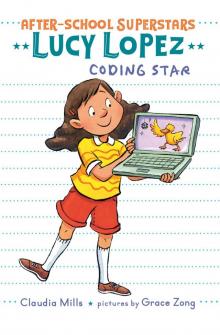 Lucy Lopez
Lucy Lopez Dinah Forever
Dinah Forever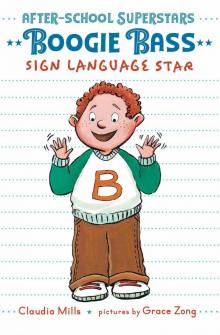 Boogie Bass, Sign Language Star
Boogie Bass, Sign Language Star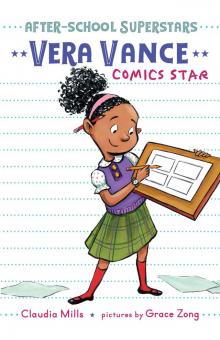 Vera Vance: Comics Star
Vera Vance: Comics Star Izzy Barr, Running Star
Izzy Barr, Running Star You're a Brave Man, Julius Zimmerman
You're a Brave Man, Julius Zimmerman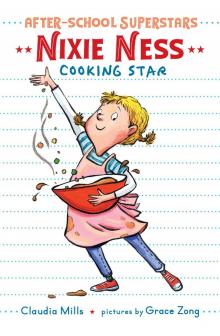 Nixie Ness
Nixie Ness The Totally Made-up Civil War Diary of Amanda MacLeish
The Totally Made-up Civil War Diary of Amanda MacLeish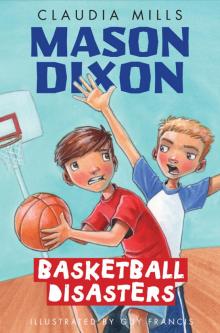 Basketball Disasters
Basketball Disasters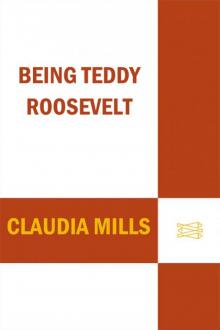 Being Teddy Roosevelt
Being Teddy Roosevelt Losers, Inc.
Losers, Inc. The Trouble with Friends
The Trouble with Friends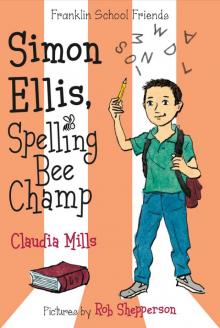 Simon Ellis, Spelling Bee Champ
Simon Ellis, Spelling Bee Champ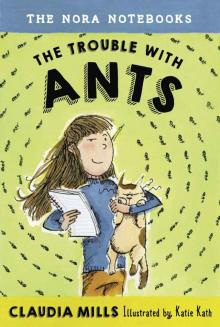 The Nora Notebooks, Book 1: The Trouble with Ants
The Nora Notebooks, Book 1: The Trouble with Ants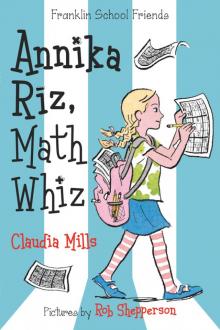 Annika Riz, Math Whiz
Annika Riz, Math Whiz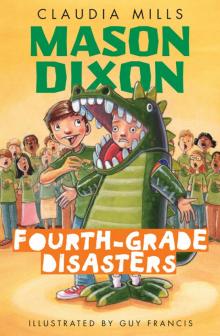 Fourth-Grade Disasters
Fourth-Grade Disasters Pet Disasters
Pet Disasters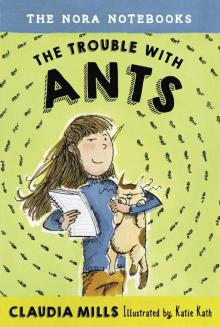 The Trouble with Ants
The Trouble with Ants Write This Down
Write This Down Alex Ryan, Stop That!
Alex Ryan, Stop That!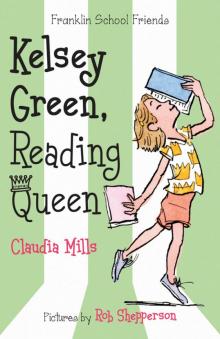 Kelsey Green, Reading Queen
Kelsey Green, Reading Queen How Oliver Olson Changed the World
How Oliver Olson Changed the World Lizzie At Last
Lizzie At Last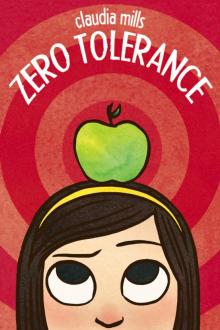 Zero Tolerance
Zero Tolerance The Nora Notebooks, Book 2
The Nora Notebooks, Book 2 Cody Harmon, King of Pets
Cody Harmon, King of Pets Fractions = Trouble!
Fractions = Trouble! Makeovers by Marcia
Makeovers by Marcia One Square Inch
One Square Inch